"There was not a moment when she did not see Carol
in her mind, and all she saw, she seemed to see through Carol."
That is a pretty arresting and passionate
description of the power and obsession of love. It is made all the more
intriguing because novelist Patricia Highsmith wrote it in her novel
The Price of Salt in 1952 Ė using the alias Claire Morgan due to
societal taboos Ė one of the early serious literary looks at a lesbian
relationship.
Highsmith was a well-regarded mystery novelist even
at the time. Her first novel Strangers on a Train had just been
made into a film by Alfred Hitchcock. Her body of work kept intriguing
readers and filmmakers alike, spawning such classic books as The
Talented Mr. Ripley, Cry of the Owl, The Two Faces of January and
Ripleyís Game. However it has been speculated that The Price of
Salt was Highsmithís most autobiographical novel.
The novel is also the latest film adaptation of
Highsmithís work, having been turned into the Oscar-buzz worthy Carol
starring Cate Blanchett (who had also been in the movie of Highsmithís
The Talented Mr. Ripley) and Rooney Mara as the central couple in
the relationship which was forbidden by their society. Kyle Chandler and
Jake Lacy play the perplexed men in their lives, and Sarah Paulson is
Carolís best friend and confidant. The screenplay was written by Phyllis
Nagy, who had known Highsmith before her death in 1995. Director Todd
Haynes had previously worked on similarly nostalgic titles like Far
From Heaven and Mildred Pierce.
Blanchett plays the title character, a married
mother whose marriage has withered since she has realized that she is
attracted to other women. She meets younger shop girl Therese (Mara)
while buying gloves, and this leads to a slow-burning
friendship-turned-courtship where the women try to repress their growing
passion, until they can no longer. Carolís angry husband Harge
(Chandler) uses their relationship as leverage to get custody of their
daughter Rindy, while Thereseís confused boyfriend Richard (Lacy) canít
seem to figure out why she is resisting his marriage offers. On the
periphery is Abby (Paulson), Carolís ex-lover and best friend who is
placed in an awkward position where she has to help the new love of a
woman for whom she still has feelings.
A few days before the film was about to be released,
we participated at a press conference at the famous Marriott Essex House
on Central Park South in which the stars, writer and director discussed
their feelings about Carol.
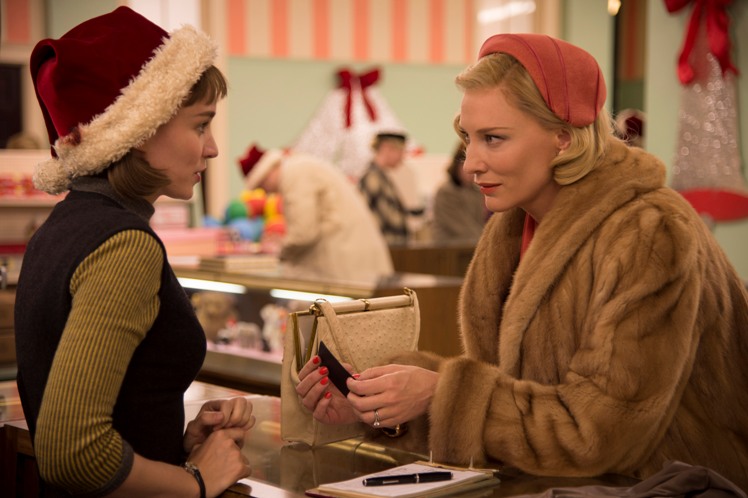 Todd, I wanted to ask
you about the emotion of the film. From the opening shot of a street
grate to a final smile, how did you approach the film and bring it
visually to the screen?
Todd, I wanted to ask
you about the emotion of the film. From the opening shot of a street
grate to a final smile, how did you approach the film and bring it
visually to the screen?
Todd Haynes:
I really was taking it on as if for the first time looking at the love
story, something that I felt I hadnít really ever accomplished directly
in my other films. That really began in reading The Price of Salt,
Patricia Highsmithís beautiful novel and the gorgeous adaptation of
Phyllisí script that first came to me with Cate attached. So, it was
quite a bundle of incentives when it first landed with me in 2013. But
love stories are unlike war, which is about conquering the object. Love
stories are about conquering the subject. Itís always the subject whoís
in a state of vulnerability and peril at some level.
Through much of Carol, that is the character
of Therese, who occupies a much less powerful position in the world than
Carol, is younger, is more open. Experiencing this woman with the
freshness that is different from Carolís life and experience. What I
loved about the story was how what happened to the two women really
moves them through a series of events which change them both. Ultimately
by the end of the film, theyíve shifted sides. Carol is the one who
comes to Therese with her heart on her sleeve at the end of the film, so
all of that made a lot of smaller elements Ė of
looking, and who is being looked at, and who is doing the looking, and
all of those questions Ė something that was very conducive to the
cinematic language.
Cate, a lot of the
character of Carol revolves around her vulnerability. What were some of
the keys for you as you approached the character?
Cate Blanchett:
I think it was questions that she hadnít been asked and she hadnít asked
herself. Carolís a deeply private person, whose sexuality in
relationship to herself is not unsettled or ambiguous, but she lives in
a quiet hell because sheís not able to fully express herself. I guess it
was the way she was brought up. She has not been in a loveless marriage.
People keep describing it as a loveless marriage. I guess that the
complicated thing for Carol Ė and being confronted by Therese at the
time in her life that it is Ė is that sheís got an enormous amount to
lose.
Sheís found an unhappy balance... if you can find an
unhappy balance with Kyle Chandler; that would be very difficult
(laughs)... with Harge because of her love for her daughter. Sheís
risking a lot. There was a beautiful line that Phyllis wrote describing
Therese as being flung out of space. I also think Carolís describing
that situation of being in uncharted territory, free-floating, as you do
when you fall in love with anyone for the first time. You feel like
youíve never been here before. Youíre being confronted with questions,
confronted with sides of yourself. It suggests a territory youíve never
been to before.
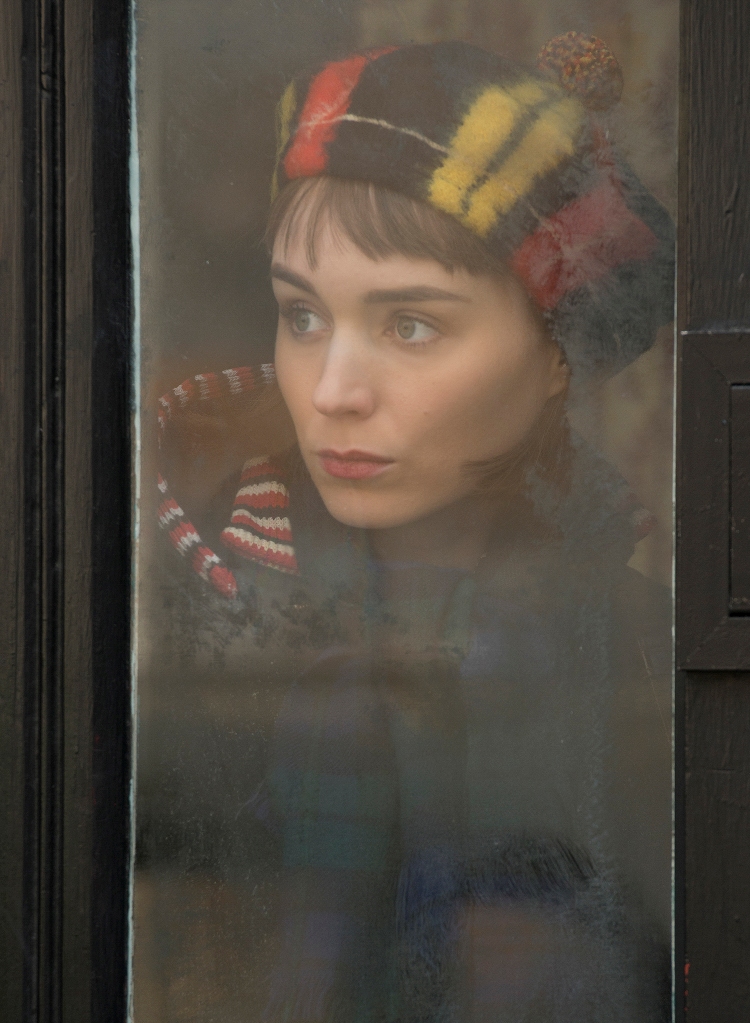 Rooney, Therese is
often shown in frames; boxes, windows, even her camera lens. Like she
has to break out. Was there anything you did to map out her journey?
Rooney, Therese is
often shown in frames; boxes, windows, even her camera lens. Like she
has to break out. Was there anything you did to map out her journey?
Rooney Mara:
Todd and I talked a lot about that. We had a few weeks of rehearsal in
Cincinnati with everyone. That was pretty much what we were doing in
rehearsal Ė not just mapping out Thereseís journey, but mapping out the
entire script. Films obviously donít film in order, so you have to do
that with every element of the script.
Phyllis, you knew
Patricia Highsmith at the end of her life. What was it like to translate
the storyís 1952 world without looking at it through a modern
sensibility?
Phyllis Nagy:
That was one of
the things that I was intent on doing Ė to not overlay a contemporary
psychology onto any of the characters. When you overlay any kind of a
psychology and overview, an ethos, youíre judging those characters
immediately. It seemed very important for all the nuances of the
relationships among the central quartet that you donít do that. Itís
very easy for me to forget about.
The first draft was many years ago, but when I
started working with Todd on this it was a
pleasure to forget that we were living right now. (laughs) We
didnít have to deal with any of the methods of communication that people
mightíve had, or the attitudes or judgments of now. We all have to be
very, very aware of what weíre doing. This is about instinct, not
calculation, although the circumstances of their lives required some
calculation.
Kyle,
Harge is complicated, feeling he has been cheated of the life he
expected. How did you humanize him with the anger that he shows?
Kyle Chandler:
Good direction. (laughs) No, just listening to what you just
said, one of the really interesting aspects about playing this character
is he is what he is on the screen. But, the way you just spoke about how
he has put it together, you (referring to Haynes) left everything
open for Harge to actually do as he will and to find those spaces. That
was interesting. As I was playing it, at some point, I realized that it
could be a stereotypical character very easily. Portray what you would
imagine of a guy from the 50ís under these circumstances. What happened
was, at some point, the worst possible moment in a manís life, or a
woman: Theyíre in love is when they realize theyíre not in love anymore.
This character never realized he wasnít in love
anymore. He was always in love, and he was intensely in love. He also
had this little child Ė not just his wife, not just his child, but his
family unit was so important to him and so important, to say nothing of
his social status and what he was. He refused to give that up. What you
said about the character allowed me as a character to stay in that and
never lose love or respect, but still be very confused. Whatís going on?
Which goes back to that one direction [Haynes] gave me: When Iím walking
in the room and I look across and I go "Who are you?!" basically. Todd
gave me a specific direction there. It really turned me. I was like: Oh,
yeah! Okay. Anyway, for me this whole thing was so much fun. It was
really refreshing, because of what the material is and just the way it
was presented. Then seeing it is wonderful.
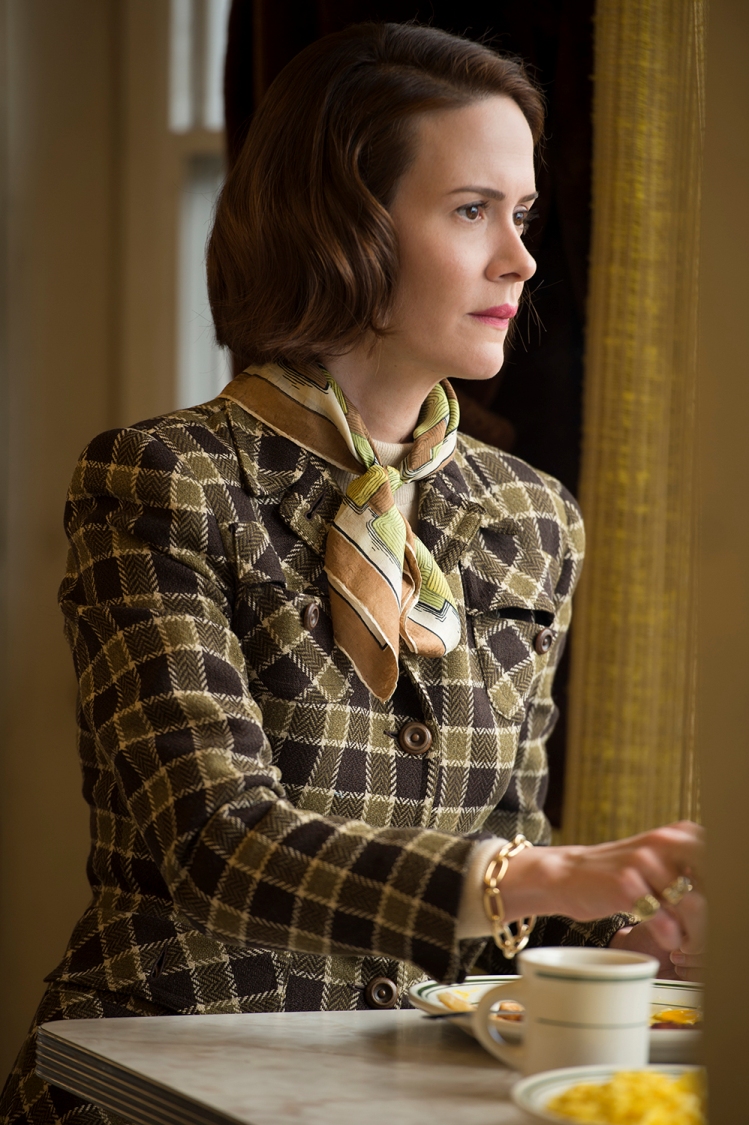 Sarah, Abbyís
friendship with Carol is so moving, because they were exes, but Abby was
helping with the new girlfriend. What were you looking at as their
relationship?
Sarah, Abbyís
friendship with Carol is so moving, because they were exes, but Abby was
helping with the new girlfriend. What were you looking at as their
relationship?
Sarah Paulson:
I really just tried to think about friendship. And selflessness. And
unwavering loyalty. I think Abby still has feelings for Carol. Itís a
challenging thing. I wonder what I personally would do if somebody I
loved and still had feelings for, if I was called upon to come in and
rescue the person that she currently loves. I donít know. It was, to me,
a testament to her friendship and her love, and I think the desire to be
around Carol and Carolís orbit no matter what. Abbyís sense of society Ė
I donít mean literal society, but her community, her friendships Ė they
were probably quite narrow at that time. So, to lose something like
that, the consequences of that would be too enormous. I just thought
about things like that.
Jake, if Harge is one
type of guy, Richard is another. As you were working on the character,
were you finding the levels of subtlety? It feels like Richard
understands something about Therese, but he canít seem to figure out why
she is dragging her feet to marry him.
Jake Lacy:
It was definitely
in the script. That subtlety was not thanks to me, for sure. Todd spoke
with me when we first met about the idea that for Richard the world is
there to take. Heís young. Heís in New York. Heís first generation
American. Heís smart. Heís handsome. He has a job. Heís got a girl. The
world is his for the taking, and yet, it slips away from him, without
knowing it. Thank God that it does, because otherwise heís 15 years or
ten years earlier than Carol and Harge and that world, if he and Therese
created a life that then wasnít a life anymore.
I donít know if I can speak to the subtlety, I think
that maybe that you were experiencing that more than my attempt to
create something. I do think, to me, for Richard itís the idea of a
dream that then falls apart, where someone is not willing to be a part
of that dream. Trying to wrangle them in when they are not meant to be
there.
Even though this is
some 50 years ago, it is a period film. With regard to the physicality,
I loved specifically how you moved. The body language of that time
versus today is quite different, even the way a cigarette is held or you
place a coffee cup. How did you achieve that?
Cate Blanchett:
For me
personally, it felt less about the period and more about what Todd was
referring to before as about "the gaze." If
the cigarette was held in a certain way and perceived by the camera in a
certain way, it was because it was viewed through the prism of someoneís
desire, rather than the prism of the period. One of the most revelatory
things that Todd showed all of us, that I found really useful was a film
called Lovers and Lollipops. In
fact, it completely subverted everything Iíd seen of the 50s represented
before. It was so fresh and immediate. I felt like everything was
happening right then and there in front of me. It was people in clothes,
not in costumes, existing and behaving with one another as we do now.
When you experience a love story, whether it is
back in the 1400s in China, or itís in 1952 in New York, it feels as if
it is this timeless connection. So the period is an important impediment
in all the dramas, details to be drawn with, but it became secondary.
Although the girdles... (laughs) Those things were hard. There
was a scene where Rooney was playing the piano. Iíd found this position
on the floor. I thought I have to be graceful, so I had to rehearse a
lot so I would be able to get up in one movement, which was difficult.
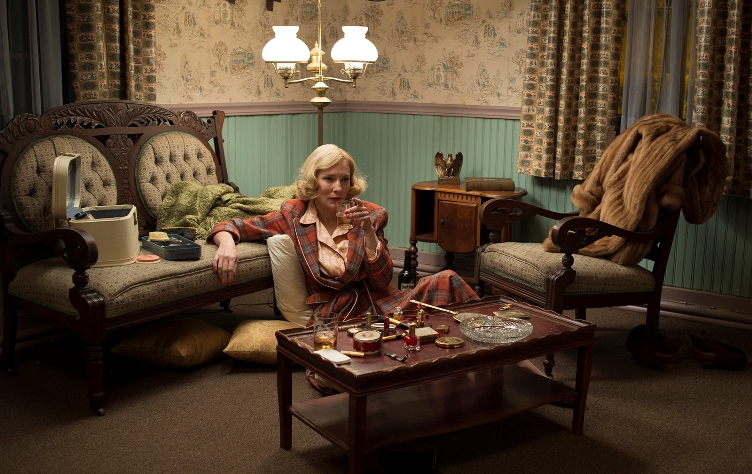 You also
looked at a lot of 50s photography, right, like Ruth Orkin?
You also
looked at a lot of 50s photography, right, like Ruth Orkin?
Todd
Haynes:
We did. Ruth Orkin is one of the color photographers we looked at, who
was photographing New York City in color at the time. Ruth Orkin was the
partner of Morris Engel. These are all New York-based artists and
photojournalists. They did psycho-dramas, not documentaries. The
Little Fugitive is the best known of their films, their
collaborations. They would use unknown actors, put them in real
locations and use real light. The Little Fugitive is the story of
a little kid who runs away to Coney Island during the day.
Lovers
and Lollipops they made a few years later. It was set in locations more relevant
to our film, but it had a woman at the center of the story. It was the
story of a single mother trying to ingratiate her daughter to a new
boyfriend. She was just a woman. She was not a wealthy woman like Carol.
But she was a woman with this tremendous poise and this gait and this
manner of speech. It was an example of this femininity that we just do
not see anymore. You might glimpse it in your grandmother, but it is
something that is not produced anymore culturally. Yet itís not
something you would see by actresses from Hollywood films from the
period. It gave an insight to something quite specific and sort of lost.
That was very useful to Cate and Rooney.
The love story did
not necessarily feel homosexual, it just felt like any relationship.
Cate Blanchett:
Itís normal.
Was that something
you were trying for?
Rooney Mara:
To me there is no difference, so it is kind of a difficult question to
answer. One of the great things about the film is that itís not a
political film. Itís not a film with an agenda. Weíre not preaching to
the audience. So people are allowed to just watch it for what it is.
Itís a love story between two humans.
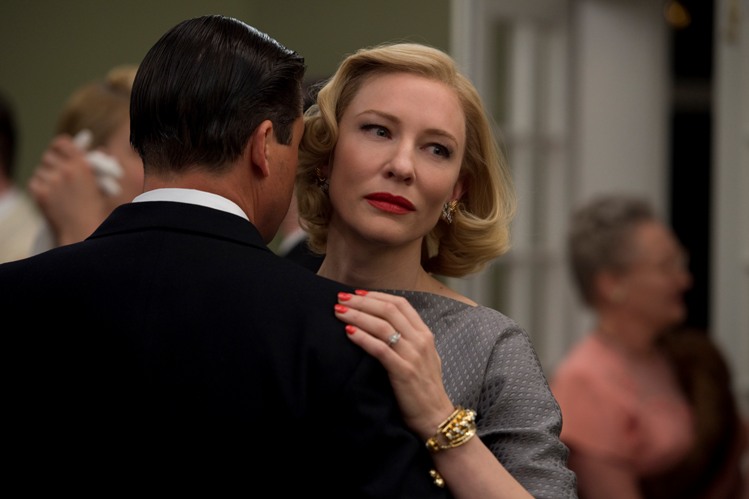 You mentioned that
Carol is risking so much, her marriage and her child. Was that in the
text of the novel?
You mentioned that
Carol is risking so much, her marriage and her child. Was that in the
text of the novel?
Phyllis Nagy:
Itís interesting
that you mention her marriage, because I think her marriage is over.
Sheís not risking her marriage. That is in Patricia Highsmithís novel.
She is risking the ability to have her child with her in the moment
after this divorce happens. I donít think she ever risks... in her heart
she is not giving up her child. She is allowing her child to grow up,
for the moment, in the environment thatís best for her. Carol is being a
good mother in allowing the child to be with Harge. Carol must be who
she is. She is not yet who she is. In order to be good for her child and
not screw her up later on, sheís got to do this. Itís actually quite
selfless. I donít think it has to do with being with Therese. I think
those two things are separate.
Todd Haynes:
I would add that she is also serving an authority over the situation, in
a veiled threat to Harge. Basically saying: I want to see Rindy on my
terms. If not this may come to court and this may get ugly. One could
only imagine how ugly this could get for someone like Harge and his
family if this really did get played out in the courts. She ends up
actually holding the reins in her hands about how and when she gets to
see her daughter. That had not been the case up until that point in the
story.
Phyllis Nagy:
Highsmith allows
us a great freedom in the novel with the character of Carol, whose own
narrative was relayed almost exclusively through Thereseís eyes. You get
these shards, these mosaic pieces of Carolís life. Now Carolís doing
this. Now I hear she is having a custody battle. It gave us great
freedom, because there is no big moment with Carol and Harge like that
in the book, to actually explore some of these things and the power
dynamic, so that itís less about will I lose my child? I personally
donít think sheís ever in danger of losing Rindy in a real sense.
Cate Blanchett:
But it is interesting, because what your question points to is the fact
that if a mother makes a choice based on her
survival she risks losing the audienceís sympathy. If it was a gay man,
somehow I donít think the question of sympathy would arise. When anyone
plays a mother onscreen thereís always a sense that thereís a right way
to parent. That you lose your identity and you become a mother first and
foremost. What I loved about Todd is that he didnít ever talk about
sympathy. Personally as an actor, I find the idea of playing for an
audienceís sympathy a kind of repulsive endeavor. (chuckles) Itís
like saying: Like me, like me!
Itís a terrible, terrible position, a
tragic position that Carol has been placed in. And Harge has been placed
in, frankly. When she says in the lawyerís office, "Weíre not ugly
people, Harge," I think thatís when the threat goes out of it. That is
the truth. You are not like this at your heart, if you take away all the
trappings of society. Iím not like this. I think thatís the issue. One
thing about working with Todd is we never discussed the sympathy.
(dramatically) The S word!
Is this a classic
case of the heart wants what the heart wants?
Cate Blanchett:
I donít
know.
Kyle Chandler:
Yes. (They all
laugh.)
Rooney Mara:
Yeah.
Cate Blanchett:
No.
(Everyone laughs again.)
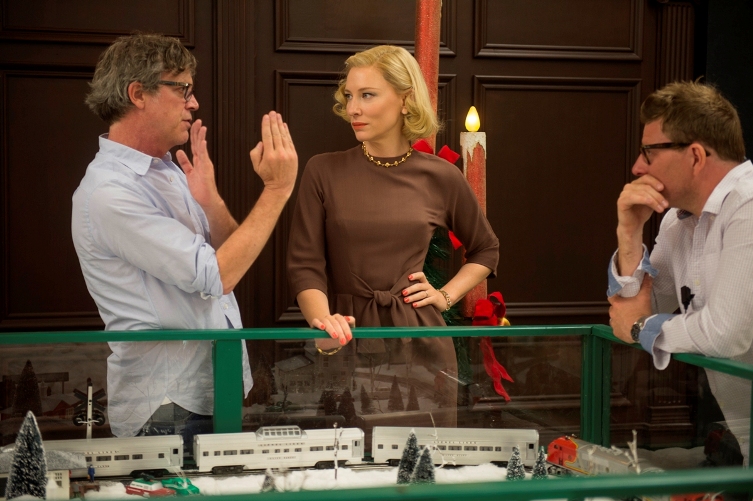 Well, when Kyle is
looking in the room at Abby, itís interesting, there is a world going on
that he is not privy to, heís not allowed into, and heís confused by it.
So his heart may want something else, but there is this whole other
situation that these other two hearts have going on that he just does
not understand. Heís not able to unlock it. Is that a fair assessment of
that scene?
Well, when Kyle is
looking in the room at Abby, itís interesting, there is a world going on
that he is not privy to, heís not allowed into, and heís confused by it.
So his heart may want something else, but there is this whole other
situation that these other two hearts have going on that he just does
not understand. Heís not able to unlock it. Is that a fair assessment of
that scene?
Todd Haynes:
Yes, clearly. You see the two satellites, the key power brokers on
either side of Carolís life, coming in direct conflict of each other in
that scene. Itís the only scene that neither Carol or Therese witness in
the film, but they are there as an extra kind of force. It is an
essential scene. Itís a showdown. About people who love Carol in
different ways, disavowing the other personís side. But they are strong
people, too.
The interesting thing about Kyleís character, Harge,
is that we are introduced to Harge at an uncustomary period in his life
as a character. One presumes that Harge has always pretty much taken
Carol for granted most of their life. But when the film begins, heís
already reevaluated her value in his life. The way heís inviting her out
and wanting to spend time with her and share time with her seems to be a
new project, a new regimen.
Smoking plays a big
part in this world, almost an addiction. Was that intended?
Todd Haynes:
Smoking is the perfect conductor of desire,
because itís a way in which you seek desire and you never fulfill it. I
know this from being an ex-smoker. Itís a practiced cycle where you seek
being satisfied, you crave that moment, but youíre always chasing an
original moment that youíll never get back to in that cigarette.
Of course itís played a key symbolic role in the history of Hollywoodís
golden age cinema, the history of films about women, and the ways that
anxieties and desires are displaced into other practices. I donít see it
as much more than that in itself.
Kyle Chandler:
That was a great
description. (Everyone laughs)
Another signifier of
Hollywoodís golden age was how it was shot Ė in 16mm (film). Could you
talk about that process?
Todd Haynes:
Ed Lachman, the director
of photography, and I had worked in super 16 on our previous project, Mildred
Pierce, which was going ultimately to be broadcast on HDTV on HBO.
We wanted to really downgrade the sophistication of lenses and stocks
today, where the grain element continually goes away. If you shot on
film, you shot on 35mm sometimes, and it blows up to HD. We loved it. We
had a really great time on that project.
The research for Carol kept
revealing the city in a very early stage. It was the transition out of
the war years. The early 1950s were something quite different from the
Eisenhower war years that we mostly attribute to that shiny, glossy
decade. I was quite interested and curious about how different this
world looked than the world perhaps of my film Far
From Heaven. We wanted to bring some of that sootiness, some of that
monochromatic color palette to the look of the film. The 16mm was one of
the ways that we did that. We also found a beautiful city that had
architectural integrity, and was really preserved in its past in many
blocks and many of the interiors that we found. We found that in
Cincinnati, Ohio. We just loved what Cincinnati brought to the film.
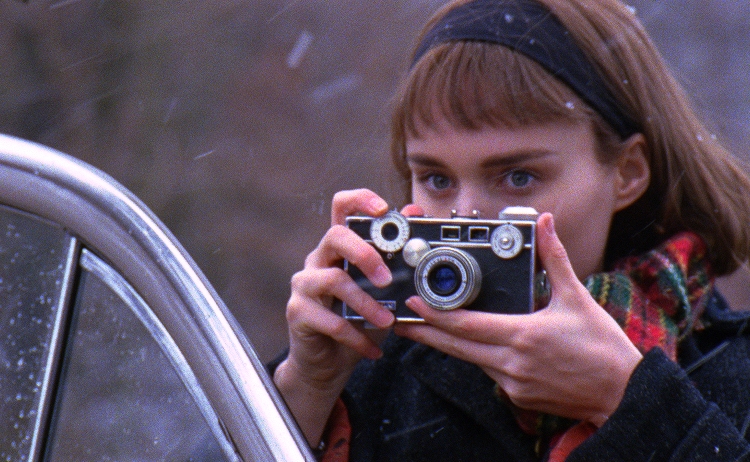 Obviously
the two women were in very different life stages, Carol being more
established and having a child and being married...
Obviously
the two women were in very different life stages, Carol being more
established and having a child and being married...
Cate Blanchett:
Older.
Older. She is helping
Therese find herself. But because they are women, do you think the age
difference is of lesser importance than it would be with a man, who may
be considered a little predatory?
Rooney Mara:
I donít know if it would ever feel predatory. Itís not like Iím 17 years
old. Therese is younger than Carol. They are at different stages in
their lives, but I donít think that she is so young. The story never
felt predatory to me. I donít think it ever really would have, man or
woman.
Cate Blanchett:
The interesting thing is the obsession. Actually, perhaps more so in the
book. Thereís this obsessive pursuit that Therese has of Carol. Because
of Carolís sense of consequence and the difference of their ages and
experiences, and also their different socio-economic backgrounds, there
is a sense of we have to quiet the horses here and not go too quickly
with this, because I know this is not necessarily going to end well.
Thatís delicious stuff to play with, because thatís what loads up all
those silences. Every word is, not only chosen by the beautiful
screenplay, but by the women. Can I say this? This might have two
meanings. Iím not sure that was taken the right way. Did I hear what I
think you were saying behind what you just said? Itís wonderful stuff to
play with this, because there is so much stuff between them and keeping
them apart.
Todd Haynes:
There are also things that a modern audience has to keep reminding
themselves were different at this time. An older woman could invite a
younger woman to lunch and it was absolutely totally appropriate, where
she would have never invited the head of the department to lunch. Or
they could check into a hotel together as two women, but if they were
heterosexual unmarried women, the couple checking into a hotel, at this
time that wouldnít have been a scandal. There are ways in which the
mores and the codes of the time are also things that were learning and
reading against their actions and justice.
Cate, you had done
another Patricia Highsmith film with
The Talented Mr. Ripley. Did you learn about The
Price of Salt back then? Did your perception of the story
change having portrayed Carol?
Cate Blanchett:
Yes, itís
a different thing entirely reading a novel and then reading it again
when you are coming to play a character in that book. I read anything I
could of hers at the time that I was making Ripley. It was
actually, much to my shame, the first time I had encountered her work. I
was also interested in all of the filmic incarnations of her work as
well, and went back and revisited it. There are some wonderful
observations in parts of internal monologue.
One internal monologue that Therese has and wonderful observations about
Carol that are in the novel that were really, really useful to read that
I just read at the time, the first time I read the book as a reader.
Today to make that stuff manifest was really exciting.
Did
Patricia want the book to be made into a film? Did she see your original
script when you knew her years ago, and if so what did she think about
it?
Phyllis Nagy:
Well, she was
dead by the time it came to me, so we didnít have that conversation.
(laughs) Iíll have it with her later tonight. (chuckles) She
didnít like many of the film adaptations of her work.
Cate Blanchett:
Didnít
she?
Phyllis Nagy:
Oh, no, she
couldnít stand them! Especially Strangers on a Train.
Cate Blanchett:
(shocked)
Oh! What does she know? (Everyone laughs.)
Phyllis Nagy:
From her perspective, the guys trade murders in that book, and the film,
of course they donít. It was one of the first arguments we had, when I
said: Oooh, I love Strangers on a Train. She said, ďHmmmÖ
really?Ē With disgust! But she liked aspects of the films. Robert Walker
she loved. She thought Alain Delon was extremely attractive, of course.
I hope that she would find this entire enterprise extremely attractive.
I think she would. We are all of us not betraying the intent and the
tone of her work, which really is the only thing that you can do Ė to be
reverent to a source material. Everything else is up for grabs.
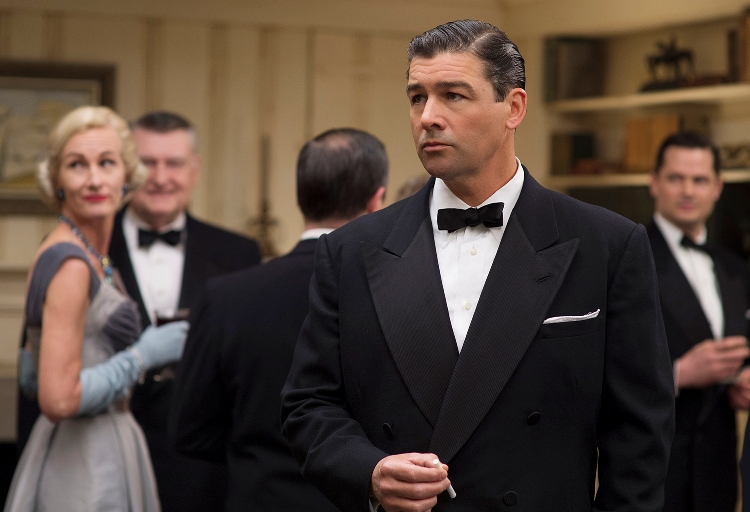 Todd, could you
comment on Kyleís performance and the qualities in him as an actor that
caused you to cast him in this role?
Todd, could you
comment on Kyleís performance and the qualities in him as an actor that
caused you to cast him in this role?
Kyle Chandler:
(mock scared) What did I do? (Everyone laughs.) I loved Strangers on a
Train.
Sarah Paulson:
I can set off the alarm any time you want.
Todd Haynes:
What can I say? I just so lucked out. Iíve been watching Kyleís work,
and have been amazed by it, as Iím sure most of you have, in Friday
Night Lights and films he has been in. Casting a man to play
opposite Cate Blanchett is not an obvious task. A lot of actors today
are just grown-up boys, wearing baseball caps still. You need to have a
real grown up opposite Cate.
Cate Blanchett:
(sexily) You need to find an animal. (Everyone laughs.)
Todd Haynes:
We found an animal in Kyle. No, but itís true. You get what I mean. Just
the way he enters that era with such a believability. I saw him in the
clothes the first time and it was like: Oh! I think you said you had an
early dramatic TV show set in the 50s?
Kyle Chandler:
Homefront. The 40s.
Todd Haynes:
Homefront. The 40s. But it just suited him so well. It was just
so utterly believable. But this started with the writing, the way Harge
is handled as a character, and Richard. Highsmith was quite hard on
these men in the book, so Phyllis brought a very different complexity
and ambiguity to the characters. You felt you understood that they were
in a place without any examples around them for what they were going
through. They were struggling and not being their very best. They were
lashing out at times and being defensive, but they were human. I think
just Kyle brings that completely to the film.
Kyle and Cate, did
you have a favorite scene you did together?
Cate Blanchett:
The dancing scene.
Kyle Chandler:
I pained her feet in the dancing scene.
Cate Blanchett:
Yeah, you know we had dancing classes together, which was interesting.
Kyle Chandler:
Youíve never done any film where you looked so frightened as when
dancing with me. My favorite scene was the one where I fell down 18
times. That was fun.
Richard is much more
angry in the book as the book goes on. We see less of that in the film.
Why did you decide on that?
Phyllis Nagy:
I suppose my intention was just... Iím not a psychopath, I canít really
enter into the heads of imaginary characters, but insofar as one can,
thatís what I try to do. I am those people. How would I feel? How would
I behave on a basic level? Certainly I empathize, I suppose, with these
men. And with the other young man in the film, who is also after
Therese, at least momentarily. It becomes easy once you do that. You
just have people behave in a way that you imagine they would. If I were
Harge, Iíd be pissed off, too. Similarly with Richard, heís given no
clue really, and perhaps heís not so great at picking up on them, but
still Therese is quite reticent and quite internal. Itís hard to please
someone like that. Thatís really all it is, I think.
Cate Blanchett:
I think
you do reach a greater point of understanding about the menís dilemma in
the screenplay than you do in the novel, because it is from Thereseís
perspective. Honestly with Harge, all Therese has seen from afar is the
damage she perceives as being done to Carol by Harge. Whatís stopping
her is this constant pulling on her from behind by Richard. There is
this constant annoyance with those two men. That is part of her youth,
but also part of her thwarted desire.
What is clear now is that what Todd did with the
filmmaking is you donít start off with that perspective. The first
argument that Therese witnesses Harge and Carol having is seen through
doors, a bit like watching your parents argue. There comes a point where
there is a greater understanding of the two menís positions.
Richard also made you
feel something almost brotherly with Therese in the film, he seems more
like a brother or a best friend than a boyfriend, at least to her.
Jake Lacy:
For Richard, I
think he feels that this is a great love. Itís probably his
first, so maybe thereís more down the road for him which will shed light
as to what this really was. But for him then, it feels like this is the
one that is getting away. I think for all these characters, for Richard
in particular, thereís a complete lack of vocabulary, a complete loss
for how to describe this or experience it. Heís searching for someone to
put a label on what this problem is, and even Therese is unable to
define it for him as sheís going through it.
That speaks to Richard, and to the time that theyíre
living in. Thereís an element in this discussion where we are walking
and Therese asks if I know people like that [gay] and Richard says he
does, but itís usually something in their past, like a psychiatric
condition that someone would be homosexual. That is the most definition
he has for whatís going on. Rather than being aggressive about it, heís
just at a complete loss as to how to make heads or tails of this
situation.
Do you feel that the
nakedness of the erotic desire is affected by the privilege of Carolís
background?
Todd Haynes:
I guess I donít particularly isolate the privilege of desire with Carol,
who has the class privilege. I think the intense state of desire that we
understand Carol through, that we keep filtering Carol through, is of
course being cast by Thereseís desire for her. In a way, that is the
machine that is moving the narrative forward through a good part of the
film, Thereseís desire. With Carol, there are moments that you wonder
how she feels about Therese. There are moments where it feels like a
detour from her life. It feels like a sidebar. An outlier to the issues
that she has to confront. That she probably at times probably wonders or
really feels embarrassed about: Am I really spending all this time with
this girl who is just taking form in front of me?
I think that all gets reevaluated later in the film.
Itís most articulated in that scene towards the end of the movie, where
they are both kind of stripped down and you see a side of Carol we
havenít seen before. I find that even though Rooney is literally the one
being explored physically, or sexually revealed more in that sex scene,
it feels like that is something that Therese is conducting as much as
Carol.
There is a sense,
too, that Therese has opportunities that Carol never had. Different
stages of life and different places.
Todd Haynes:
Yeah. That line that Carol gives, that people have brought up to me and
was even a point of question when we were making the film, when Carol
looks at Thereseís body and says "I never looked like that." A kind of
expression of intimacy that is hard to find the parallel to among gay
men, and certainly not heterosexual couples. Itís something pretty
unique to what two women might be able to say to each other. Even though
you look at Cate and go, yeah, right! (Everyone laughs.)
Cate Blanchett:
I never did look like that.
What can you take
with you from this film to inspire you in your next projects?
Kyle Chandler:
The last scene in the film. The last scene in the film. The strength and
the power and the conviction and the heroism of Cateís character in all
the moments that happen in that room. In allowing the other character to
look at this woman as someone that is not his wife anymore alone, but
someone that he has respect for and looks up to, created a whole new
type of love, if you will, for the characters to go on, as they do into
the 60s and the 70s and everything. It still gives me chills. They
worked up to that. Itís a really beautiful, strengthful Ė oh,
strengthful, Iím from Texas, sorry. It was very powerful. Itís an
reflection of what that is today. The confluence of what is happening in
the present. Itís that love. That was really powerful.
CLICK
HERE TO SEE WHAT CATE BLANCHETT HAD TO SAY TO US IN 2007!